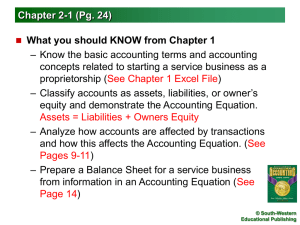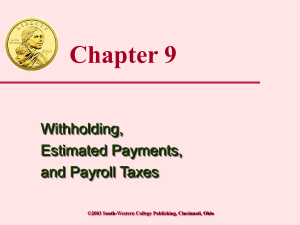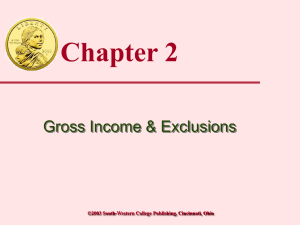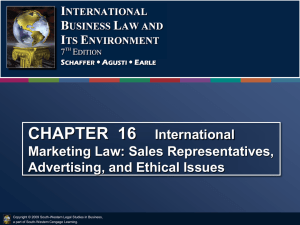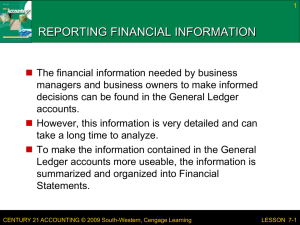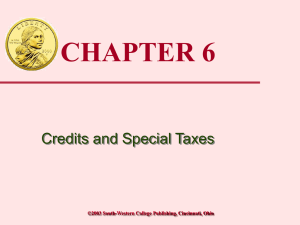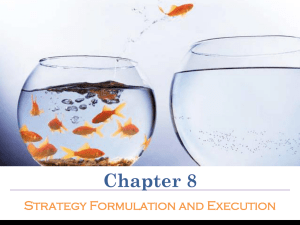Business Law Chapter 7 PPT
advertisement
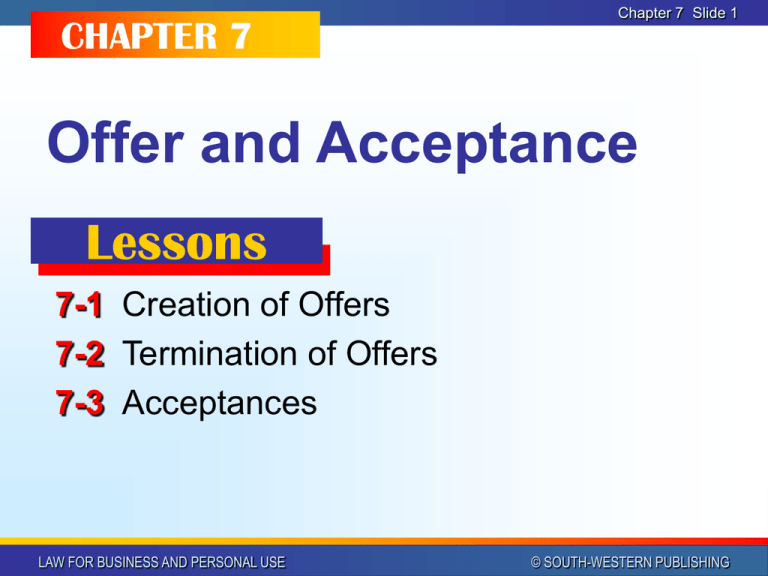
CHAPTER 7 Chapter 7 Slide 1 Offer and Acceptance Lessons 7-1 Creation of Offers 7-2 Termination of Offers 7-3 Acceptances LAW FOR BUSINESS AND PERSONAL USE © SOUTH-WESTERN PUBLISHING Chapter 7 Slide 2 LESSON 7-1 Creation of Offers GOALS List the elements required to form a contract Describe the requirements of an offer LAW FOR BUSINESS AND PERSONAL USE © SOUTH-WESTERN PUBLISHING Chapter 7 Slide 3 Hot Debate – pg. 110 1) Should Celia be bound because the literal meaning of her words suggests she intended to sell the car? 1) Argument can be made - should be bound by literal meaning of words 2) Should Celia not be bound to sell the car because the circumstances (new car stalls and people are honking) suggest that she did not intend to sell? 1) Argue - literal meaning of sentences often is quite different from what someone intended LAW FOR BUSINESS AND PERSONAL USE © SOUTH-WESTERN PUBLISHING Chapter 7 Slide 4 WHAT IS A CONTRACT? A contract is an agreement that courts will enforce. Contracts between two parties are the basis for all economic activity. Contracts are the legal links between the individuals and companies producing and consuming goods and services. LAW FOR BUSINESS AND PERSONAL USE © SOUTH-WESTERN PUBLISHING Chapter 7 Slide 5 CONTRACT REQUIREMENTS There are six major requirements that must be satisfied before courts will treat transactions as contracts. Offer and acceptance Consideration Genuine assent Capacity Legality Writing LAW FOR BUSINESS AND PERSONAL USE © SOUTH-WESTERN PUBLISHING Chapter 7 Slide 6 CONTRACT REQUIREMENTS Offer and Acceptance – there must be a serious, definite offer to contract. And the terms of the offer must be accepted by the party to whom it was communicated LAW FOR BUSINESS AND PERSONAL USE © SOUTH-WESTERN PUBLISHING Chapter 7 Slide 7 CONTRACT REQUIREMENTS Genuine Assent – cannot be based on: Deception Important mistake Use of unfair pressure to obtain offer/acceptance LAW FOR BUSINESS AND PERSONAL USE © SOUTH-WESTERN PUBLISHING Chapter 7 Slide 8 CONTRACT REQUIREMENTS Legality - make up of agreement must be legal i.e. Cannot create an agreement to have someone commit a crime for you LAW FOR BUSINESS AND PERSONAL USE © SOUTH-WESTERN PUBLISHING Chapter 7 Slide 9 CONTRACT REQUIREMENTS Consideration – agreement must involve both sides receiving something of legal value as a result of the transaction LAW FOR BUSINESS AND PERSONAL USE © SOUTH-WESTERN PUBLISHING Chapter 7 Slide 10 CONTRACT REQUIREMENTS Capacity – parties must be able to contract for themselves LAW FOR BUSINESS AND PERSONAL USE © SOUTH-WESTERN PUBLISHING Chapter 7 Slide 11 CONTRACT REQUIREMENTS Writing - some agreements must be placed in writing to be fully enforceable in court LAW FOR BUSINESS AND PERSONAL USE © SOUTH-WESTERN PUBLISHING Chapter 7 Slide 12 Contracts - oral or written Does it matter if a contract is only oral? LAW FOR BUSINESS AND PERSONAL USE © SOUTH-WESTERN PUBLISHING Chapter 7 Slide 13 REQUIREMENTS OF AN OFFER Expression of intent to create a legal obligation Offer must be complete and clear Offer must be communicated to the offeree LAW FOR BUSINESS AND PERSONAL USE © SOUTH-WESTERN PUBLISHING Chapter 7 Slide 14 Contract: Painter Example Painter promises to paint house within 30 days for $3,000 (Offer) Homeowner agrees to the time frame and the $3,000 (Acceptance) Painter OFFEROR Homeowner OFFEREE LAW FOR BUSINESS AND PERSONAL USE © SOUTH-WESTERN PUBLISHING Chapter 7 Slide 15 CONTRACT REQUIREMENTS Offer – proposal by an offeror to do something, provided the offeree does something in return If the offeree accepts the proposal, a contract arises Valid Offer: 1) Offeror must appear to intend to create a legal obligation (serious) 1) Objective test of the reasonable person 1) Not based on what someone was thinking – unreasonable to expect courts to figure out what you were thinking LAW FOR BUSINESS AND PERSONAL USE © SOUTH-WESTERN PUBLISHING Chapter 7 Slide 16 CONTRACT REQUIREMENTS 2) Appearance counts – If you think you are joking, but a reasonable person would interpret your conduct as indicating that you intend to contract – you have made an offer On the other hand, if you are serious, but a reasonable person would interpret your conduct as a joke, then no legally enforceable offer is made 2) terms must be definite and complete 3) Offer must be communicated to the offeree LAW FOR BUSINESS AND PERSONAL USE © SOUTH-WESTERN PUBLISHING Chapter 7 Slide 17 Test of Reasonable Person Examines: offeror’s words conduct in light of all relevant facts and circumstances Words spoken in jest / frenzied terror / anger = no offer intended LAW FOR BUSINESS AND PERSONAL USE © SOUTH-WESTERN PUBLISHING Chapter 7 Slide 18 Preliminary Negotiations Tentative terms, inviting others to make offers i.e. “I think I’m interested in selling my laptop computer for around $1,000. Is anybody interested?” -- not an offer LAW FOR BUSINESS AND PERSONAL USE © SOUTH-WESTERN PUBLISHING Chapter 7 Slide 19 Where do you stand? Brent and Lisa were students in a class on movie production. Knowing that the final movie in the Alien Cheerleader trilogy was about to come out, Brent camped out overnight at the theater. He bought two tickets, and then asked Lisa to go with him. LAW FOR BUSINESS AND PERSONAL USE © SOUTH-WESTERN PUBLISHING Chapter 7 Slide 20 Where do you stand? Lisa agreed. Lisa would have to call in sick to her evening job as waitress in order to go Calling out sick would cost her more than $100 in wages & tips She still made the call When Brent did not show up to get her, she confronted him LAW FOR BUSINESS AND PERSONAL USE © SOUTH-WESTERN PUBLISHING Chapter 7 Slide 21 Where do you stand? Brent admitted he sold the tickets to someone else for $50 each Should Lisa be allowed to sue Brent for not taking her to the movie?? LAW FOR BUSINESS AND PERSONAL USE © SOUTH-WESTERN PUBLISHING Chapter 7 Slide 22 Where do you stand? Almost every state would NOT allow such a lawsuit Social invitations do not produce enforceable contracts LAW FOR BUSINESS AND PERSONAL USE © SOUTH-WESTERN PUBLISHING Chapter 7 Slide 23 Social Arrangements Friends agreeing to go to movies Social arrangements = not contracts LAW FOR BUSINESS AND PERSONAL USE © SOUTH-WESTERN PUBLISHING Chapter 7 Slide 24 Offer Must be Complete & Clear terms must be sufficiently complete and clear to allow a court to determine what the parties intended Pg. 112 – “In this case” LAW FOR BUSINESS AND PERSONAL USE © SOUTH-WESTERN PUBLISHING Chapter 7 Slide 25 Complete Terms Offers should contain price / subject matter / quantity Amount of detail depends on complexity of transaction i.e. Real estate sale (identify lot, price, terms of payment, delivery date) Candy bar sale (price, subject matter, quantity) LAW FOR BUSINESS AND PERSONAL USE © SOUTH-WESTERN PUBLISHING Chapter 7 Slide 26 Clear “In this case” - Delgados agreed on “one lot” – no specification as to which lot. lacking essential information LAW FOR BUSINESS AND PERSONAL USE © SOUTH-WESTERN PUBLISHING Chapter 7 Slide 27 READ B E F O R E signing LAW FOR BUSINESS AND PERSONAL USE © SOUTH-WESTERN PUBLISHING Chapter 7 Slide 28 Implied Terms Terms can be implied by law or common business practice i.e. Merchants and customers - price is not specified; current market price is the basis for the contract LAW FOR BUSINESS AND PERSONAL USE © SOUTH-WESTERN PUBLISHING Chapter 7 Slide 29 Advertisements NOT offers - invitations to make offers What’s Your Verdict – pg. 112 Did the Anchors Aweigh advertisement make offers to the would-be buyers? Customers: made Offers Sellers must make reasonable supply available – no expectation to meet every demand LAW FOR BUSINESS AND PERSONAL USE © SOUTH-WESTERN PUBLISHING Chapter 7 Slide 30 Advertisements Can be offers: 1) Written clearly and indicating limited quantities -- book example of selling car to first person 2) Asks offeree to perform an act as a way of accepting -- first person to appear at the main door of a shopping mall on … LAW FOR BUSINESS AND PERSONAL USE © SOUTH-WESTERN PUBLISHING Chapter 7 Slide 31 Offer Must be Communicated to Offeree Non-intended offeree cannot accept the offer Cannot accept if unaware of offer (reward) LAW FOR BUSINESS AND PERSONAL USE © SOUTH-WESTERN PUBLISHING Chapter 7 Slide 32 What’s your Verdict? Pg. 111 Did the two friends create a contract? Yes – even though delivery and payment will occur later LAW FOR BUSINESS AND PERSONAL USE © SOUTH-WESTERN PUBLISHING Chapter 7 Slide 33 E-Contracts: Agreeing Online When I'm online and I click on a button that says "I ACCEPT," are all of those terms actually enforceable against me, even if I didn't read them? West's Digital Video Library – video #23 LAW FOR BUSINESS AND PERSONAL USE © SOUTH-WESTERN PUBLISHING Chapter 7 Slide 34 If you don’t satisfy the law’s requirement for creating an offer, then you usually don’t have a contract. TRUE / FALSE LAW FOR BUSINESS AND PERSONAL USE © SOUTH-WESTERN PUBLISHING Chapter 7 Slide 35 TRUE LAW FOR BUSINESS AND PERSONAL USE © SOUTH-WESTERN PUBLISHING Chapter 7 Slide 36 To be valid, an offer must indicate an intent to create a legal obligation. TRUE / FALSE LAW FOR BUSINESS AND PERSONAL USE © SOUTH-WESTERN PUBLISHING Chapter 7 Slide 37 TRUE LAW FOR BUSINESS AND PERSONAL USE © SOUTH-WESTERN PUBLISHING Chapter 7 Slide 38 Which of the following are reasons why an offer may not be valid? A) It is apparent that the speaker is joking B) It is clear that the speaker is trying to obtain additional information rather than commit to an agreement C) The subject of the agreement is only social D) all of the above LAW FOR BUSINESS AND PERSONAL USE © SOUTH-WESTERN PUBLISHING Chapter 7 Slide 39 D - all of the above LAW FOR BUSINESS AND PERSONAL USE © SOUTH-WESTERN PUBLISHING Chapter 7 Slide 40 The requirement that an offeror show an intent to contract is a(n) ______ test rather than a test which focuses on the purported offeror’s actual thoughts. LAW FOR BUSINESS AND PERSONAL USE © SOUTH-WESTERN PUBLISHING Chapter 7 Slide 41 Objective LAW FOR BUSINESS AND PERSONAL USE © SOUTH-WESTERN PUBLISHING Chapter 7 Slide 42 Which of the following is evidence showing an intent to contract A) spoken or written words B) conduct other than speaking or writing C) other facts and circumstances D) all of the above LAW FOR BUSINESS AND PERSONAL USE © SOUTH-WESTERN PUBLISHING Chapter 7 Slide 43 D – all of the above LAW FOR BUSINESS AND PERSONAL USE © SOUTH-WESTERN PUBLISHING Chapter 7 Slide 44 Advertisements can be offers when A) they are complete B) they are clear C) they address the problem of numerous recipients and a limited supply of the advertised product D) all of the above LAW FOR BUSINESS AND PERSONAL USE © SOUTH-WESTERN PUBLISHING Chapter 7 Slide 45 D - all of the above LAW FOR BUSINESS AND PERSONAL USE © SOUTH-WESTERN PUBLISHING Chapter 7 Slide 46 If an offer is made, it can be accepted by anyone who learns of it. TRUE / FALSE LAW FOR BUSINESS AND PERSONAL USE © SOUTH-WESTERN PUBLISHING Chapter 7 Slide 47 FALSE LAW FOR BUSINESS AND PERSONAL USE © SOUTH-WESTERN PUBLISHING Chapter 7 Slide 48 The test of the reasonable person is used by a jury or judge to evaluate all the relevant evidence to determine whether there has been a manifestation of an intent to contract. TRUE / FALSE LAW FOR BUSINESS AND PERSONAL USE © SOUTH-WESTERN PUBLISHING Chapter 7 Slide 49 TRUE LAW FOR BUSINESS AND PERSONAL USE © SOUTH-WESTERN PUBLISHING Chapter 7 Slide 50 To meet the contract requirement of genuine assent, the agreement must not be based on A) deception B) an important mistake C) using unfair pressure D) all of the above LAW FOR BUSINESS AND PERSONAL USE © SOUTH-WESTERN PUBLISHING Chapter 7 Slide 51 D - all of the above LAW FOR BUSINESS AND PERSONAL USE © SOUTH-WESTERN PUBLISHING LESSON 7-2 Chapter 7 Slide 52 Termination of Offers GOALS Describe how an offeror can end an offer Tell how an offeree can end an offer Explain how the parties can create offers that cannot be ended by the offeror LAW FOR BUSINESS AND PERSONAL USE © SOUTH-WESTERN PUBLISHING Chapter 7 Slide 53 HOW CAN OFFERS BE ENDED? Revocation by the offeror – can be revoked anytime before it is accepted by the offeree REVOCATION - right to withdraw an offer before it is accepted Not effective until communicated to the offeree LAW FOR BUSINESS AND PERSONAL USE © SOUTH-WESTERN PUBLISHING Chapter 7 Slide 54 HOW CAN OFFERS BE ENDED? Time stated in the offer – offeror may state how and when the offer must be completed i.e. Bank agrees to give loan but specifies acceptance must be received by Oct. 18 Boggs mails acceptance on Oct. 17 -- arrives Oct. 20 at bank offer NOT received by time specified Offer E-X-P-I-R-E-D LAW FOR BUSINESS AND PERSONAL USE © SOUTH-WESTERN PUBLISHING Chapter 7 Slide 55 HOW CAN OFFERS BE ENDED? Reasonable length of time – amount of time depends on surrounding circumstances Rejection by the offeree – offer is terminated by the offeree’s rejection LAW FOR BUSINESS AND PERSONAL USE © SOUTH-WESTERN PUBLISHING Chapter 7 Slide 56 Negotiation Terms JOE Offer Accept or Reject or Counteroffer LAW FOR BUSINESS AND PERSONAL USE BOB Accept or Reject or Counteroffer © SOUTH-WESTERN PUBLISHING Chapter 7 Slide 57 HOW CAN OFFERS BE ENDED? Counteroffer – offeree must accept offer exactly as it was made (no changes) – otherwise, it becomes a counteroffer In this Case – pg. 116 Haviland submitted written offer to sell to Ping a luxury apt. bldg in San Fran. Property Price $15.5 million cash Ping replied (certified mail) offering to pay $14.4 million cash Haviland rejected price. Ping writes “I am shocked by your price but feel it is urgent to invest in San Fran. Therefore, I accept your offer and will pay $15.5 million cash Was a contract formed? No, Ping’s $14.4 m price was a counteroffer eliminated Haviland’s offer at $15.5 LAW FOR BUSINESS AND PERSONAL USE © SOUTH-WESTERN PUBLISHING Chapter 7 Slide 58 HOW CAN OFFERS BE ENDED? Death or insanity of either the offeror or offeree Contracts are agreements voluntarily entered into by the parties and subject to their control Death or insanity eliminates such control terminating their offers LAW FOR BUSINESS AND PERSONAL USE © SOUTH-WESTERN PUBLISHING Chapter 7 Slide 59 What’s Your Verdict? Melissa offered her collection of baseball cards to Raoul for $3,0000. Raoul requested time to think it over – Melissa agreed Melissa changed her mind, called Raoul and said “I’ve changed my mind, I’m not interested in selling the cards.” Raoul – “It’s too late, you promised to sell them to me, and I’ve got the money so I accept.” LAW FOR BUSINESS AND PERSONAL USE © SOUTH-WESTERN PUBLISHING Chapter 7 Slide 60 What’s your Verdict? Pg. 115 Was Melissa’s offer terminated before Raoul tried to accept? Because Melissa revoked first, there was no offer alive when Raoul tried to accept LAW FOR BUSINESS AND PERSONAL USE © SOUTH-WESTERN PUBLISHING Chapter 7 Slide 61 The Mailbox Rule LAW FOR BUSINESS AND PERSONAL USE © SOUTH-WESTERN PUBLISHING Chapter 7 Slide 62 HOW CAN AN OFFER BE KEPT OPEN? Generally, offeror is NOT obliged to keep offers open even if offeror agreed to do so IF OFFEREE HAS GIVEN NOTHING IN EXCHANGE FOR THE PROMISE LAW FOR BUSINESS AND PERSONAL USE © SOUTH-WESTERN PUBLISHING Chapter 7 Slide 63 HOW CAN AN OFFER BE KEPT OPEN? Options – offeree gives the offeror something of value in return for a promise to keep the offer open Firm offers – special rule that applies to merchants for sale of goods/services stating in a signed writing how long it is to stay open Not open more than three months True even when nothing is paid by offeree Death/Insanity do not terminate option contracts or firm offers LAW FOR BUSINESS AND PERSONAL USE © SOUTH-WESTERN PUBLISHING Chapter 7 Slide 64 Offers expire at the time stated in the offer. TRUE / FALSE LAW FOR BUSINESS AND PERSONAL USE © SOUTH-WESTERN PUBLISHING Chapter 7 Slide 65 TRUE LAW FOR BUSINESS AND PERSONAL USE © SOUTH-WESTERN PUBLISHING Chapter 7 Slide 66 If an offeree clearly rejects the offer, the offer is said to be: a) Counteroffered b) Revoked c) Expired d) Terminated LAW FOR BUSINESS AND PERSONAL USE © SOUTH-WESTERN PUBLISHING Chapter 7 Slide 67 d) Terminated LAW FOR BUSINESS AND PERSONAL USE © SOUTH-WESTERN PUBLISHING Chapter 7 Slide 68 When an offeree changes the offeror’s terms in important ways, the offeror makes a(n) ________________ LAW FOR BUSINESS AND PERSONAL USE © SOUTH-WESTERN PUBLISHING Chapter 7 Slide 69 Counteroffer LAW FOR BUSINESS AND PERSONAL USE © SOUTH-WESTERN PUBLISHING Chapter 7 Slide 70 Which of the following does not describe a method used to terminate offers? a) Revocation by the offeror b) Offeror is admitted to the hospital for tests c) Counteroffer d) Death of the offeree LAW FOR BUSINESS AND PERSONAL USE © SOUTH-WESTERN PUBLISHING Chapter 7 Slide 71 B) Offeror is admitted to the hospital for tests LAW FOR BUSINESS AND PERSONAL USE © SOUTH-WESTERN PUBLISHING Chapter 7 Slide 72 An offeree who rejects an offer can later accept it if the acceptance occurs within a reasonable time after the rejection. TRUE / FALSE LAW FOR BUSINESS AND PERSONAL USE © SOUTH-WESTERN PUBLISHING Chapter 7 Slide 73 FALSE LAW FOR BUSINESS AND PERSONAL USE © SOUTH-WESTERN PUBLISHING Chapter 7 Slide 74 Which of the following will cause an offer to end? a) Occurrence of an event, such as the passage of time, which the offer said would cause it to end b) Passage of a reasonable time if nothing is said in the offer about the length of its life c) Revocation by the offeror d) Counteroffer by the offeree e) All of the above LAW FOR BUSINESS AND PERSONAL USE © SOUTH-WESTERN PUBLISHING Chapter 7 Slide 75 E) All of the above LAW FOR BUSINESS AND PERSONAL USE © SOUTH-WESTERN PUBLISHING Chapter 7 Slide 76 If an offeree gives the offeror something of value to keep an offer open, this is called a(n) ________________ LAW FOR BUSINESS AND PERSONAL USE © SOUTH-WESTERN PUBLISHING Chapter 7 Slide 77 Counteroffer LAW FOR BUSINESS AND PERSONAL USE © SOUTH-WESTERN PUBLISHING Chapter 7 Slide 78 A barber, speaking to a longtime customer said, “I promise not to raise my prices for you this year.” Is this offer binding? YES / NO ? LAW FOR BUSINESS AND PERSONAL USE © SOUTH-WESTERN PUBLISHING Chapter 7 Slide 79 NO LAW FOR BUSINESS AND PERSONAL USE © SOUTH-WESTERN PUBLISHING Chapter 7 Slide 80 A barber said, “I promise not to raise my prices for you this year if you pay me $10 today.” If this offer binding if you pay the ten dollars? YES / NO LAW FOR BUSINESS AND PERSONAL USE © SOUTH-WESTERN PUBLISHING Chapter 7 Slide 81 YES LAW FOR BUSINESS AND PERSONAL USE © SOUTH-WESTERN PUBLISHING Chapter 7 Slide 82 If a hardware store salesman said, “This price on the lawnmowers is good for 30 days,” would this be a firm offer? YES / NO LAW FOR BUSINESS AND PERSONAL USE © SOUTH-WESTERN PUBLISHING Chapter 7 Slide 83 NO LAW FOR BUSINESS AND PERSONAL USE © SOUTH-WESTERN PUBLISHING Chapter 7 Slide 84 If a beauty salon hair designer said, “This price on the cut and dry is good for 30 days,” then wrote it down on a piece of paper and signed it, would this be a firm offer? YES / NO LAW FOR BUSINESS AND PERSONAL USE © SOUTH-WESTERN PUBLISHING Chapter 7 Slide 85 YES LAW FOR BUSINESS AND PERSONAL USE © SOUTH-WESTERN PUBLISHING LESSON 7-3 Chapter 7 Slide 86 Acceptances GOALS Discuss the requirements of an effective acceptance Determine at what point in time an acceptance is effective LAW FOR BUSINESS AND PERSONAL USE © SOUTH-WESTERN PUBLISHING Chapter 7 Slide 87 HOW ARE ACCEPTANCES CREATED? ACCEPTANCE occurs when a party to whom an offer has been made agrees to the proposal To create an enforceable contract the acceptance must: 1) Be made by the person or persons to whom the offer was made 2) Match the terms in the offer 3) Be communicated to the offeror LAW FOR BUSINESS AND PERSONAL USE © SOUTH-WESTERN PUBLISHING Chapter 7 Slide 88 HOW ARE ACCEPTANCES CREATED? Who can accept an offer? – can only be accepted by person to whom offer was made What’s Your Verdict? Darrow offered to trade his digital camera to Monette in exchange for her camcorder. Schorling, who had a camcorder of the same make and model, overheard the offer and said she would make the swap Did a contract result from Schorling’s statement? Only Monette, not Schorling, could accept Darrow’s offer LAW FOR BUSINESS AND PERSONAL USE © SOUTH-WESTERN PUBLISHING Chapter 7 Slide 89 HOW ARE ACCEPTANCES CREATED? Acceptance must match the offer – offeror may specify the terms of acceptance Acceptance must be communicated to the offeror – must be more than a mental decision LAW FOR BUSINESS AND PERSONAL USE © SOUTH-WESTERN PUBLISHING Chapter 7 Slide 90 In This Case RING LOST at Zuma Beach in front of beach house. Lady’s yellow-gold band with 12 small diamonds. Inside inscribed “Like diamonds. Forever Yours, J.R.J.” $1,00 reward. Call 555-8142 Dowell saw this newspaper advertisement and rushed to the beach with a homemade sand sifter. About ten other people were also searching, using various devices. After four hours, Dowell shouted. “Eureka! I’ve found it!” She promptly returned the ring to its owner. She alone was legally entitled to the reward. LAW FOR BUSINESS AND PERSONAL USE © SOUTH-WESTERN PUBLISHING Chapter 7 Slide 91 ACCEPTANCE MUST MATCH THE OFFER Mirror image rule – terms in the acceptance must exactly match the terms contained in the offer If it varies any term, it is a counteroffer Courts in some states apply this rule only when the term in the offer is material (important) By statute (UCC) the rule has been changed in contracts for sale of goods such as books, computers, clothing, and food LAW FOR BUSINESS AND PERSONAL USE © SOUTH-WESTERN PUBLISHING Chapter 7 Slide 92 ACCEPTANCE MUST MATCH THE OFFER Goods – if offeror requires acceptance must exactly match terms set forth in the offer, than any variation is a counteroffer Absent this requirement in the offer, an unequivocal acceptance of an offer for a contract for a sale of goods can be valid even if it includes new or conflicting terms LAW FOR BUSINESS AND PERSONAL USE © SOUTH-WESTERN PUBLISHING Chapter 7 Slide 93 GOODS In This Case - On Thursday, the manager of Volume Value Vacuum, Inc. (VVV), offered by mail to sell model 234A vacuum cleaners to Susan’s Shops, a retailer, at the bargain price of $129 each, with payment to be made on delivery. Susan accepted in writing but stated, “payment due 30 days after delivery.” VVV said nothing in reply. A contract resulted on the area of agreement (model 234A at $129). Because both parties are merchants and VVV did not object to the modification, it will become a part of the contract if it is not material. Because an extension of credit is probably material, it does not become a part of the contract LAW FOR BUSINESS AND PERSONAL USE © SOUTH-WESTERN PUBLISHING Chapter 7 Slide 94 ACCEPTANCE MUST BE COMMUNICATED TO THE OFFEROR Silence as acceptance – one is not obliged to reply to offers made by others In This Case – Kulich, an art dealer, wrote Chang, “I understand you are interested in selling your four-panel Chinese lacquer screen. I sold it to you in 1997 for $500 and said it would go up in value. Now I offer to buy it back for $3,000. Unless I hear from you to the contrary. I’ll treat your silence as acceptance and send my truck to pick it up next Monday morning. The driver will bring my certified check for the full amount.” Chang did not reply Chang would not be bound to sell the screen LAW FOR BUSINESS AND PERSONAL USE © SOUTH-WESTERN PUBLISHING Chapter 7 Slide 95 Silence as acceptance You receive by mail a calculator. The sender states that if you wish to keep it, you must send in a check for $40, otherwise send it back. What does the law require you to do? Nothing LAW FOR BUSINESS AND PERSONAL USE © SOUTH-WESTERN PUBLISHING Chapter 7 Slide 96 ACCEPTANCE MUST BE COMMUNICATED TO THE OFFEROR Unilateral acceptance – offeror requires that the offeree indicate acceptance by performing his or her obligations under the contract Bilateral acceptance – require that the offeree accept by communicating the requested promise to the offeror When acceptance is effective – may be communicated orally, in person, or by telephone LAW FOR BUSINESS AND PERSONAL USE © SOUTH-WESTERN PUBLISHING Chapter 7 Slide 97 Will Your Contract Be Enforced Under the Law? The unconscionability defense is concerned with the fairness of both the process of contract formation and the substantive terms of the contract. When the terms of a contract are oppressive or when the bargaining process or resulting terms shock the conscience of the court, the court may strike down the contract as unconscionable. LAW FOR BUSINESS AND PERSONAL USE © SOUTH-WESTERN PUBLISHING Chapter 7 Slide 98 The unconscionability defense applies to a wide variety of types of conduct, so a court will look at a number of factors in determining if a contract is unconscionable. If there is a gross inequality of bargaining power, so the weaker party to the contract has no meaningful choice as to the terms, and the resulting contract is unreasonably favorable to the stronger party, there may be a valid claim of unconscionability. LAW FOR BUSINESS AND PERSONAL USE © SOUTH-WESTERN PUBLISHING Chapter 7 Slide 99 A court will also look at whether one party is uneducated or illiterate, whether that party had the opportunity to ask questions or consult an attorney, and whether the price of the goods or services under the contract is excessive. LAW FOR BUSINESS AND PERSONAL USE © SOUTH-WESTERN PUBLISHING Chapter 7 Slide 100 How much consideration, or payment, must there be for a contract to be valid? There is no minimum amount. A price is only how people agree to value something, so there's no absolute standard of whether a price is fair or reasonable. The courts presume that people will only make deals that they consider worthwhile. So if you want to sell your car to your friend for $1 instead of $1,000, you can do it An exception may be found if the consideration given is so out of line with what is being received that it would "shock the conscience of the court." LAW FOR BUSINESS AND PERSONAL USE © SOUTH-WESTERN PUBLISHING
